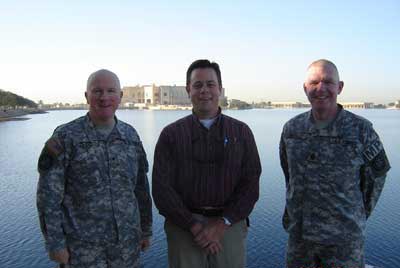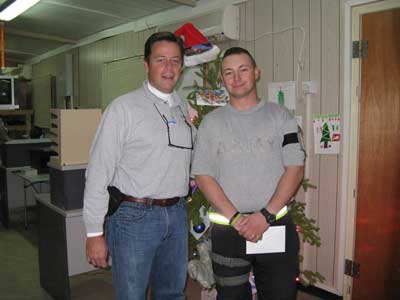|
|
| On the front lines |
| By Ann Coppola, News Reporter |
| Published: 04/28/2008 |
 It was mid-December of last year, and David Donahue had been in Iraq for several days. Standing inside a makeshift office at Camp Bucca, the United States Army’s largest military detention center, the Indiana Department of Correction Commissioner was still adjusting to daily life in a war zone among 20,000 Iraqi detainees and thousands of soldiers.
It was mid-December of last year, and David Donahue had been in Iraq for several days. Standing inside a makeshift office at Camp Bucca, the United States Army’s largest military detention center, the Indiana Department of Correction Commissioner was still adjusting to daily life in a war zone among 20,000 Iraqi detainees and thousands of soldiers.Colonel James Brown, the commander at Camp Bucca, walked into the office where Donahue and a modestly decorated artificial Christmas tree were waiting. The intense and highly energetic Brown had someone to introduce to Donahue that might help him to feel more at home. “He had gone out onto this enormous military base with thousands of soldiers, and found an employee of INDOC that was stationed at the Camp Bucca detention facility,” Donahue says. “It was one of our COs, SPC Randy Kuhlman, and I had met him before at Putnamville Correctional in Indiana. Here was a classic corrections professional doing the same line of work in his military role. And it was also a reminder of just how small this world really is.” The story of how two Indiana corrections professionals came face to face in the Iraq desert can be traced to last fall, when the U.S. Army Secretary, Pete Geren, asked Donahue to go to Iraq to review the coalition forces’ detention operations. Donahue visited Iraq nearly one year after President Bush’s much debated 2007 troop surge. As the security presence in Iraq increased, so did the number of suspected Iraqi insurgents in U.S. military custody. The estimated number of detainees at the beginning of 2008 was 24,000, but Donahue says those numbers are now on the decline. “They are now releasing more individuals back into the community than they are accepting into the facilities, and that is a very positive trend,” he says. “That is the ultimate objective, to work those numbers down.” The U.S. camps, also referred to as “theater internment facilities” or TIFs, do not hold individuals sentenced for a crime: there are no fixed terms of detention. After capturing detainees, the military holds them until it can determine whether or not they can be safely released to the community or be referred to the Iraqi courts system. To combat hopelessness among the detainees and to prevent the camps from becoming recruiting centers for radical militant groups, the Army is taking a decidedly corrections approach toward its detention operations. In fact, correctional fingerprints can be found all over the camps, from the developing educational, vocational, and religious programming to the review boards that operate much like parole board meetings. “All of the managers realize the experience these individuals have in detention could have a lifelong impact for them,” Donahue says, “that’s why it’s so important to promote hope and opportunity in the detention environment.”  “It was riveting to sit with Major General Stone, a commander who has such keen focus, who realizes that the significant number of men detained are going to be returned to the community,” Donahue says. “That is his objective and why he has brought about things like job training, family visitation, and education for the detainees.” The educational component is also a vital security tool for the Army. For example, the Army hopes that teaching the detainees how to read will allow them to interpret the Koran for themselves, rather than believing what extremists tell them. As he learned more about this programming, Donahue once again found a fellow corrections professional on the front lines. “I had the pleasure to meet Anna Callahan, a Major in the National Guard and Lieutenant in the Bureau of Prisons, who had such a personal focus and passion about the delivery of education,” Donahue recalls. “She and her staff actually built a classroom to create the opportunity to promote literacy among detainees. They call the educational system at both camps the ‘House of Wisdom,’ and it’s also available to the juveniles in detention.” The Army is currently working on making the educational programming available to the nearly 24,000 detainees throughout Iraq. It’s a daunting task, but one, Donahue says, everyone is eager take on. “When I was visiting with [Kuhlman], he told me he realized the opportunity he had while he was there was to literally change the environment for the better,” Donahue says. “He was very proud, and he knew at the end of the day, that because of his efforts, Iraq was a better place.”  “Indiana will release 18,000 inmates this year alone, and if we don’t promote hope and opportunity during their time of incarceration, there are going to be new crimes and additional victims,” Donahue says. “The correlation with Iraq and the detention facilities is that the major focus is on what will be happening to the individual when he leaves detention and goes home.” “I had a preconceived notion about the war before I went to Iraq based on the information we receive in the news and media,” Donahue adds, “but now that I’ve spent time there, I know that what is going on in our detention operations is absolutely phenomenal. There’s no question in my mind our soldiers are doing the right things for the right reasons.” Back in the U.S. at INDOC central headquarters the name of every employee serving in the military is listed on the lobby wall. It serves as a reminder for all those who walk by to keep these individuals in mind, no matter their connection to or view of the Iraq War. Related Resources: Listen to an NPR story on the detention camps More information on programming for detainees |
Comments:
Login to let us know what you think
MARKETPLACE search vendors | advanced search

IN CASE YOU MISSED IT
|


Thank you so much for this artical my husband is the one it is Spc Kuhlman ...it made me very proud to read this i knew nothing about it ...I am very proud of my husband and everyone that is over there doing there job for this country i just wanted to leave this comment to let you thank you for it and i and everyone in this family are proud of what he does Thank you Brittany Kuhlman Proud Army Wife
Good job Army. It sounds like all have the right idea in mind and common correctional goal. It will work in the middle east as well as it does in the US. Gene Atherton